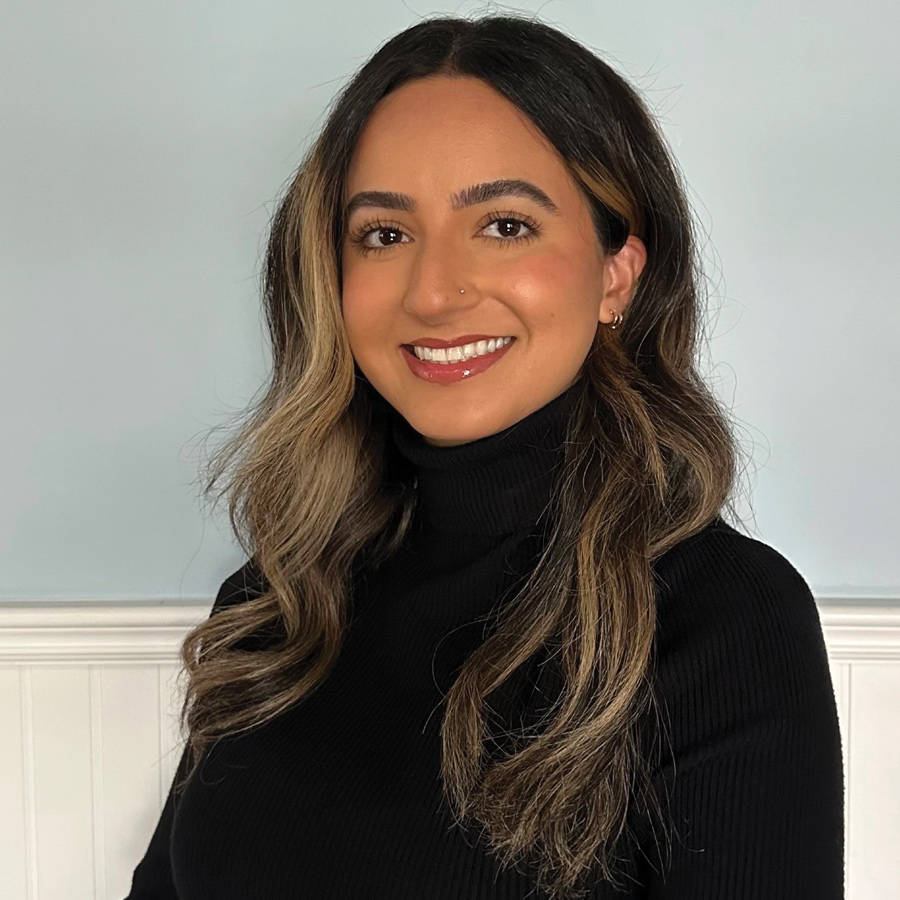
Helping others has always come naturally to Master of Arts in Counselling Psychology graduate Daveena Sangha.
A first-generation Canadian and eldest of four siblings, she began her career in law enforcement before realizing that what truly drew her in was the human side of the work – understanding people, their stories, and their mental health.
That realization sparked a shift in direction that led her to Yorkville University, where she found both the flexibility and the community she needed to pursue her calling as a counsellor. Throughout her studies, Daveena balanced her coursework, job, and internship with grace, discovering meaningful connections with classmates and professors along the way.
Now working as a counsellor supporting survivors of violence and facilitating attachment-based training for caregivers of at-risk youth, Daveena continues to embody the empathy and dedication that define her approach to helping others heal.
She recently sat down to reflect on her Yorkville journey, what she’s learned from the MACP program, and her hopes for the future of her work in mental health care.
What brought you to Yorkville University? Where were you in your life/career when you decided to continue your studies with us?
I first heard about Yorkville University when I began exploring whether graduate school might be the right next step for me. At the time, I had completed my bachelor’s degree in Psychology and Criminology from Simon Fraser University and wanted to continue working in the mental health field, but from a counselling perspective. I also knew I wanted a program that offered flexibility so I could continue working, at least part-time, while completing my studies. Yorkville’s program felt like the perfect fit, it allowed me to balance my coursework, job, and internship, and I’m so grateful for how it all came together.
What made you decide to pursue your Master of Arts in Counselling Psychology?
I’ve always been drawn to understanding people and their mental health. Even when I worked in the law enforcement field and imagined building my career there, I found myself most interested in the wellbeing of frontline officers and first responders. Coupled with my own lived experiences and a lifelong tendency to be the “listening ear” to my loved ones, pursuing a Master of Arts in Counselling Psychology felt like a natural next step. It’s been a way to align my curiosity, compassion, and desire to support others into meaningful work.

What is the most important thing you’re taking away from your studies at Yorkville University?
One of the most important things I’m taking away from my studies at Yorkville University is the reminder that genuine connection can exist even when we’re miles apart. Despite being spread across the world and connected mainly through technology, I was able to form meaningful relationships with classmates, professors, and supervisors. I was especially fortunate to complete my internship at the Chilliwack Youth Health Centre, where I worked closely with several other Yorkville interns. Together, we built a strong sense of community, learning from one another, supporting each other through challenges, and celebrating our growth along the way. I also credit so much of my learning to my professors and practicum coordinators, who provided thoughtful feedback and support, and continually encouraged us to reflect on our practice.
What are your plans after graduation, both immediate and long term?
After graduation, I plan to continue my work with the organization I’m currently with, which supports individuals who have experienced domestic violence, as well as begin building my private practice. I also facilitate an attachment-based staff training group for support workers who work with at-risk youth, and I hope to continue doing that long-term. Looking ahead, I want to keep learning, growing, and staying open to wherever this path takes me. My heart has always been in youth work as I’ve worked with youth for years now, and I hope to continue supporting at-risk youth along their journey. My hope is to continue working with clients from all walks of life and to keep learning about and discovering meaningful ways to support others through connection and understanding.
If you offered one piece of advice to an incoming student, what would that be?
This program is truly what you make of it. Show up, give it your all, and don’t be afraid to lean on your people: your professors, classmates, and support network. Just because we’re online doesn’t mean we have to lose our sense of community. Stay connected, ask questions, and support one another along the way, and you’ll be surprised by how much you grow, both personally and professionally.






